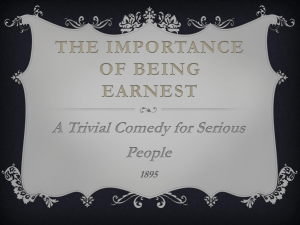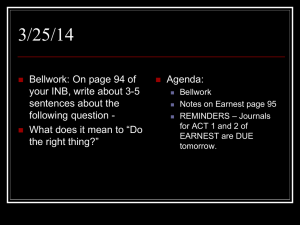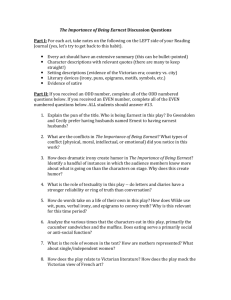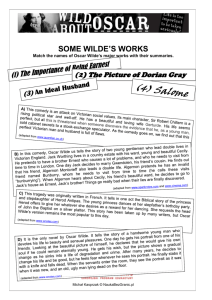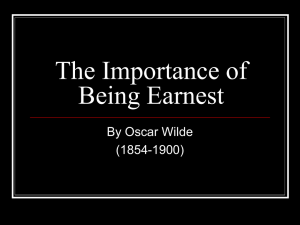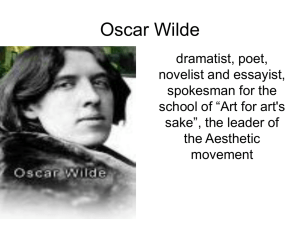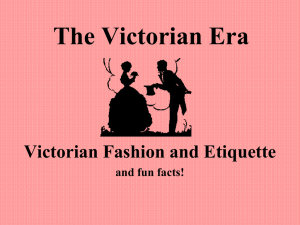Literary
advertisement
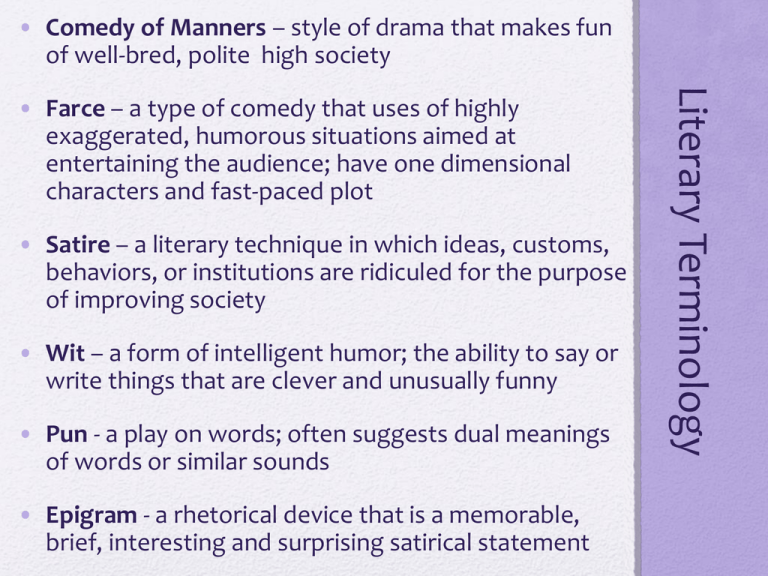
• Comedy of Manners – style of drama that makes fun of well-bred, polite high society • Satire – a literary technique in which ideas, customs, behaviors, or institutions are ridiculed for the purpose of improving society • Wit – a form of intelligent humor; the ability to say or write things that are clever and unusually funny • Pun - a play on words; often suggests dual meanings of words or similar sounds • Epigram - a rhetorical device that is a memorable, brief, interesting and surprising satirical statement Literary Terminology • Farce – a type of comedy that uses of highly exaggerated, humorous situations aimed at entertaining the audience; have one dimensional characters and fast-paced plot The Importance of Being Earnest By Oscar Wilde Essential Targets for The Importance of Being Earnest • What elements of humor does Oscar Wilde use in the play? • What is a pun? • What is an epigram? • What is a farce? • What is the definition of satire? • What is the basic plot of the play? • What is the central theme of the play? • What are the stereotypical roles portrayed by the characters in the play? • How does the play criticize the shallowness, social codes, and decorum of the Victorian society? Oscar Wilde About the Author: Oscar Wilde • Born 1854 in Ireland; lived in England and abroad • Born to an upper class family; father (doctor) and mother (poet) • Attended Trinity College in Ireland and Oxford University (studied the classics) in England • Died 1900 in Paris http://www.biography.com/people/oscar-wilde-9531078 Oscar Wilde: The Man “One should either be a work of art, or wear a work of art.”---Oscar Wilde • Rebelled against the prudish, moral, religious culture of Victorian England • Considered a “dandy” – a man who paid excessive attention to his physical appearance • Known as the wild, flamboyant, witty, well-educated “bad boy” of his time • Married with children; engaged in homosexual relationships including an affair with Lord Alfred Douglas “Bosie” • Homosexuality was illegal in England until 1967; served 2 years hard labor; scandalous • Spent the remainder of his life isolated and poor in Paris Oscar Wilde: The Writer "Life is much too important a thing ever to talk seriously about it.” ---Wilde • Wrote several plays, essays, children’s fairy tales, but only one novel, The Picture of Dorian Gray • Aesthete (Lectured on the Philosophy of Aesthetics) • Believed in the value of “art for art’s sake” - art should avoid social, political, and moral themes and concentrate instead on creating beauty • Life should attempt to imitate art • Perfected the style of comedy of manners – making fun of well-bred, polite high society • The audience essentially paid to laugh at themselves. Victorian Period: Review • British Empire = 25% of the world • Period of peace, prosperity, refinement, national self-confidence (and contradiction) • Appearance in dress and manners believed to indicate inward morality • Strict social codes of conduct; morality substituted for religion • Social and sexual restraint were a high public and private priority • English society was divided into classes: aristocratic families “old money,” growing middle class “new money,” working classes, poor Victorian Period: Expectations of Gender • Young women were always chaperoned until they were married. • Women’s clothing covered them from neck to ankle; clothes had to be modest. • Marriage often had more to do with achieving and maintaining social status than with love. Victorian Fashion • For the Ladies Victorian Fashion • For the Gentlemen Etiquette INTRODUCTIONS LEAVING CARDS PAYING CALLS PRECEDENCY THE COLLOQUIAL APPLICATION OF TITLES POINTS OF ETIQUETTE AS REGARDS ROYAL PERSONAGES POINTS OF ETIQUETTE WHEN TRAVELLING ABROAD, AND PRESENTATIONS AT FOREIGN COURTS THE RECEIVED MODE OF PRONOUNCING CERTAIN SURNAMES PRESENTATIONS AT COURTS AND ATTENDING COURTS… ---From MANNERS AND RULES OF GOOD SOCIETY The Importance of Being Earnest • Written in 1895 • Bridges Victorian and Modern Periods • A satirical comedy in 3 acts • Criticizes Victorian moral and social values • Uses wit, puns, exaggeration, and wordplay to create humor https://www.youtube.com/watch?v=a6au_dDoHBY https://www.youtube.com/watch?v=OMTpQfFypIs Settings • Time: Around 1890 • Place(s): • London (“the City”) • Jack’s House in the Country (a very large estate) • The village church The PloT: Jack Worthington, a man of means, lives a double life: Jack in the country and Ernest in the city. In the country he cares for his ward, the lovely Cecily. In the city, he enjoys the freedom of a wild bachelor. However, he has come to the city this time to propose to Gwendolen, the daughter of Lady Bracknell and cousin of Algernon Montclief. Algernon is a dandy who also lives a double life to avoid society’s obligations. Lady Bracknell (That’s Aunt Augusta to Algernon.) disapproves of Jack/Ernest’s desire to marry Gwendolen because he does not have the social standing she expects for her daughter. (Gwendolen, by the way, adores Jack/Ernest, though she does not know about his life as Jack…so the play begins!
